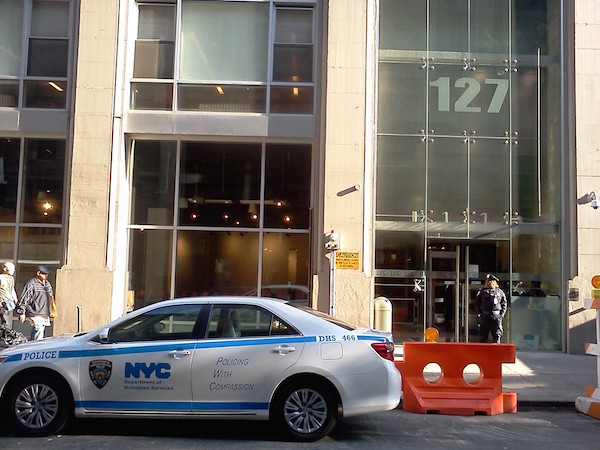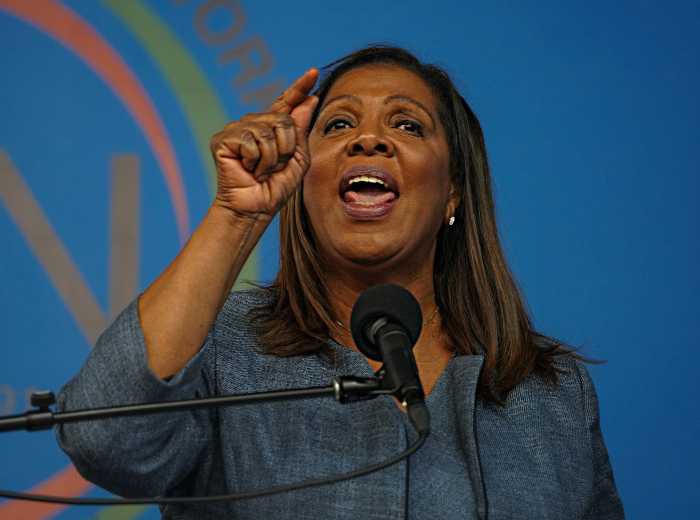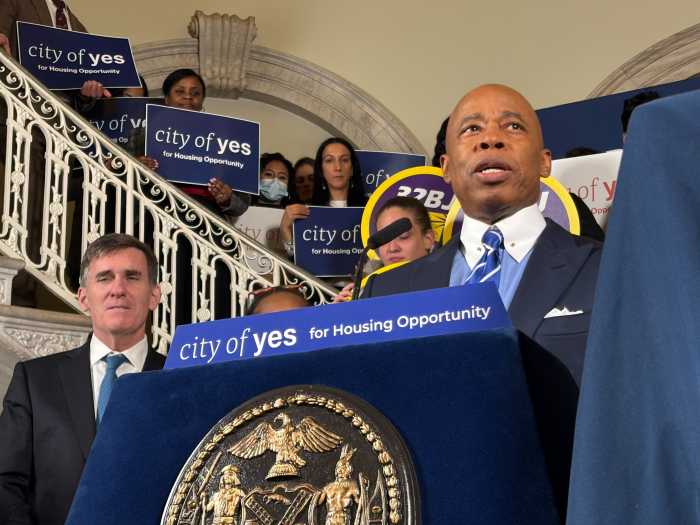
BY WINNIE McCROY | After a series of minor-level assaults this summer outside of the Bowery Residents’ Committee (BRC) shelter at 127 W. 25th St. (btw. Sixth & Seventh Aves.), the Department of Homeless Services (DHS) has assigned a contingent of 24 “peace officers” to keep order. When neighbors expressed concerns that the officers would not run patrols outside the facility to stop the pattern of attacks and general quality of life crimes such as drug deals, public intoxication and public urination that have plagued the area since the shelter opened three years ago, the DHS has now agreed to institute regular patrols.
“BRC took and continues to take the issue of safety and security seriously, responds immediately and cooperates fully with the police, DHS and all officials,” said BRC Executive Director Muzzy Rosenblatt. “We support and welcome the arrival of DHS peace officers in the coming weeks and have worked only collaboratively with all involved to facilitate their arrival.”
DHS Press Secretary Christopher R. Miller told Chelsea Now that they were assigning a full complement of peace officers to the site to monitor the building and patrol the perimeter of the facility. These officers will not carry guns, but they are trained in security measures, and are able to make arrests and issue summons. X-ray and metal detectors will be installed at the shelter, and there will also be a marked DHS vehicle parked outside the facility.
Councilmember Corey Johnson reportedly allocated $1 million in funds from DHS earlier this year for these security upgrades. On Sept. 23, DHS Deputy Commissioner Michael Gagliardi told Johnson he would install a lieutenant, two sergeants and 21 peace officers to the shelter, starting in mid-October (they arrived on the weekend of Oct. 11 & 12).
The incidents that most recently prompted this assignation include an attack on a female tourist from New Zealand on July 22 at nearby business, The City Quilter. Owner Dale Riehl reportedly witnessed a man (who appeared to be hallucinating under the influence of drugs) hit the woman in the chest and yell at her. Riehl took a picture of the man and went to the shelter next door to explain what happen.
After interviewing the woman and witness, police officers then went to the BRC and were told that the man had left the building. The next day, the assailant was reportedly back, pacing in front of The City Quilter.
More recently, on Sept. 23, a 24-year-old female employee from 130 W. 25th St. (directly across from BRC) was reportedly entering her building in the afternoon when a 64-year-old man grabbed her breasts, put his hands around her neck, and told her he had to talk to her.
The woman recognized her assailant from the block, and called police. The next day as officers escorted her to work, she pointed out the man who was standing outside of BRC, and they watched him walk into the facility.
The NYPD reportedly experienced resistance from BRC staff in locating the man. After an hour, they found and arrested the man, who reportedly is not a resident, but receives therapy and meals at the shelter.
Local resident Carla Nordstrom remarked, “Had there been DHS peace officers patrolling our block, it is possible that these incidents could have been prevented.”
Other reported incidents include a man who assaulted another resident with his crutches inside the facility on Aug. 28, and a 74-year-old man arrested with 148 bags of heroin in May.
ELECTED OFFICIALS HELP GET SECURITY
According to BRC Community Advisory Board member Tina DiFeliciantonio, concerned citizens had worked with Councilmember Johnson, who allocated the funds for a patrol force during the hours when clients were circulating outside of the facility (they have a 10 p.m. curfew). So she was shocked to discover at a recent BRC meeting that the patrol force was no longer going to happen, saying, “people felt like the rug was pulled out from under their feet without any prior notification and without consultation of the community, which is why this money was appropriated in the first place. At this point the community is pushing to put the money where it originally belonged: for foot patrol.”
DiFeliciantonio, who is a supportive voice for the BRC and their programs, was also concerned that Rosenblatt had not answered queries regarding where he stands on the issue of neighborhood foot patrols.
“The last I heard, Muzzy was going to have the BRC do the patrols on the perimeter. But that’s not what the community is asking for. Standing in front of the BRC is highly inadequate,” said DiFeliciantonio. “I had experience with four DHS offices in front of BRC recently. I walked along with a client who just exited, and they did a drug deal right in front of me. I went back to tell the officers, and said they might be interested that a drug dealer is on corner. It really points to a need for patrols. And I really believe it would service the clients and their need for healing and sobriety as well as the residents and businesses on street. To me it just makes common sense.”
DiFeliciantonio says her bedroom window is only 15 feet away from where BRC residents sleep, but notes that she has not experienced any related issues. She said that unlike others, she was never opposed to the influx of homeless people in the neighborhood, and understands their desire to get sober and improve their lives. But she cannot abide by the stonewalling about keeping these clients and her neighbors safe in the process.
“I asked DHS if they had done an evaluation of this plan, because peace officers can’t even see to the east or on the opposite side of the street at all because of construction,” she said. “To me this should be about an exchange of information, so progress can be made. Instead, a lack of transparent communication between all parties is what I have found.”
She believes that Johnson’s office is working behind the scenes to rectify this situation and address the larger issue, and is confident that eventually things will change for the better. But for now, she finds fault with the issue that BRC clients who are trying to get clean and sober must also run the gauntlet of drug dealers who are also being drawn to that area, looking to make a quick buck.
DHS, BRC AGREE TO PATROL THE BLOCK
In response to these community concerns, as well as those voiced by Councilmember Johnson on behalf of his constituents, Commissioner Gagliardi penned an Oct. 7 letter saying that they had revised their tactics.
“The effectiveness of the security plan at the BRC 25th Street shelter residence has been called to our attention for review and consideration,” he wrote. “In consultation with our provider agency The Bowery Residents’ Committee and your office, we have decided to augment security measures at this site in the following ways.”
For the next two months, the DHS will have two peace officers patrol the block every four hours from 8 a.m. until midnight. In addition, BRC security will patrol the block every two hours from 8 a.m. to midnight.
“We are committed to engaging in an ongoing dialogue with your office, BRC and staff regarding the effectiveness of these patrols, and reevaluating after this two month period,” Gagliardi wrote. “We will continue to have the patrol car outside the building.”
Johnson was pleased with the results of the situation, telling Chelsea Now, “The security plan that the Department of Homeless Services is implementing is a significant step forward, as it puts in place what the community has been advocating for over the past several months. It is important that this proposal be given an opportunity to work, and I support DHS evaluating the program two months from now. I also think that DHS has a lot to learn from the folks who live on the block, and that an on-going dialogue with the community, BRC, and DHS must continue.”
Chelsea Now was not permitted to sit in on the BRC’s Oct. 7 Community Advisory Board (CAB) meeting, with Miller saying, “Our CAB meetings are generally limited to the provider, shelter residents, elected and invited guests like NYPD…that said, it was a productive meeting.”
But with the community concerns being addressed, albeit on a trial basis, neighbors to BRC will be able to determine over the next two months whether regular patrols make a difference in curbing these ongoing quality-of-life issues.
“These developments show DHS’s dedication to the community process, and our commitment to the safety of our clients, staff, and surrounding community,” said Miller.
Rosenblatt expressed a similar sentiment, saying, “BRC is committed to working with our neighbors and government partners to sustain the success we enable our clients to achieve in an environment that embraces safety, security and respect.”






























